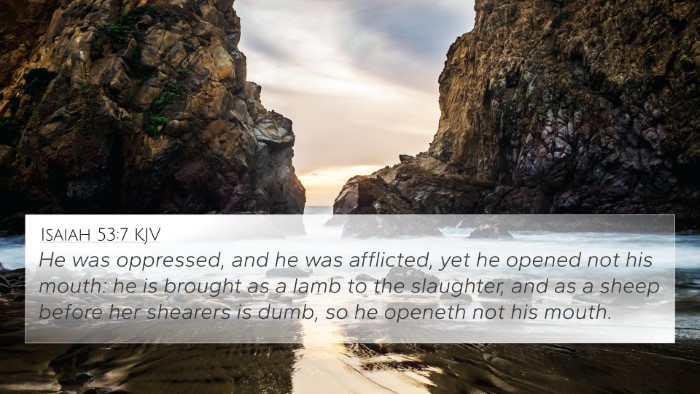Psalms 38:13 - Meaning and Interpretation
Bible Verse: Psalms 38:13 (KJV) - "But I, as a deaf man, heard not; and I was as a dumb man that openeth not his mouth."
Summary of Psalms 38:13
This verse conveys feelings of silence and inability to respond, reflecting deep sorrow and affliction. The psalmist presents himself as a 'deaf man' and a 'dumb man', indicating a state of being overwhelmed by his circumstances. The imagery speaks volumes about his emotional and spiritual condition during a time of distress.
Commentary Insights
This section combines insights from various public domain commentaries including those by Matthew Henry, Albert Barnes, and Adam Clarke:
Matthew Henry's Commentary:
Matthew Henry emphasizes the profound silence of the psalmist in the face of suffering. He notes the metaphor of being 'as a deaf man' highlights a person's sense of isolation from both God and others during times of grief. Henry suggests this relates to a deeper spiritual principle—true humility in accepting one’s condition before God.
Albert Barnes' Commentary:
Albert Barnes points out that the psalmist’s inability to speak indicates a complete submission to God's will. He interprets the silence as an acknowledgment of guilt and misery, resonating with the themes of repentance and contrition that often surface in the Psalms. Barnes further connects the verse to the broader biblical narrative of suffering and divine help.
Adam Clarke's Commentary:
Adam Clarke reflects on the metaphor of dumbness, asserting that it signifies helplessness in the face of adversity. He interprets this silence as a signal of intense inner conflict and emotional turmoil. Clarke highlights the importance of silent trust in God, suggesting that sometimes speaking out is unnecessary when God knows our hearts.
Key Themes in Psalms 38:13
- Isolation and Silence: The verse illustrates a period of emotional and spiritual isolation.
- Suffering and Affliction: Highlights the physical and mental suffering experienced by the psalmist.
- Spiritual Reflection: Encourages readers to reflect on their own silence in times of distress.
- Trust in God: Emphasizes the importance of reliance on God even in silence.
Bible Verse Cross-References
Several Bible verses resonate with the themes presented in Psalms 38:13. Here are some key cross-references:
- Job 13:19: Job's struggle with silence amidst his suffering.
- Isaiah 53:7: The silent suffering of the Suffering Servant.
- Matthew 26:63: Jesus during His trial, embodying silence in the face of accusation.
- Romans 8:26: The Spirit intercedes for us when we cannot articulate our needs.
- Psalms 39:9: The psalmist's resignation to God's will in silence.
- Psalms 77:4: A cry to God while feeling abandoned and silent.
- 1 Peter 2:21-23: Following Christ’s example of silence in suffering.
Connections Between Bible Verses
This verse shows clear connections to the themes of suffering, silence, and divine reliance found throughout Scripture. The following insights may assist in exploring these inter-Biblical dialogues:
- Old Testament Themes: Many Old Testament figures experienced distress and silence before God, particularly in moments of deep trial.
- New Testament Parallels: The New Testament emphasizes Jesus' own silence in suffering, drawing parallels with the contemplations in the Psalms.
- Comparative Analysis: A detailed comparative study reveals consistent biblical motifs of suffering leading to trust and reliance on divine providence.
Tools for Bible Cross-Referencing
For those interested in further exploring the connections between Bible verses mentioned above, consider utilizing the following tools:
- Bible concordance for locating specific terms across scriptures.
- Bible cross-reference guide to easily identify links between verses.
- Cross-reference Bible study materials for deeper analysis.
Conclusion
Psalms 38:13 encapsulates profound emotions of silence amidst distress, serving as a reminder of the importance of trust in God during difficult times. The various commentaries provide insights that encourage a deeper understanding of this verse, embodying a timeless connection to the experience of suffering. By examining cross-references and utilizing study tools, readers can appreciate the rich inter-Biblical dialogue surrounding this powerful verse.







